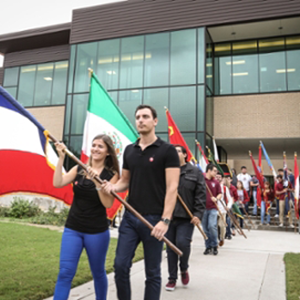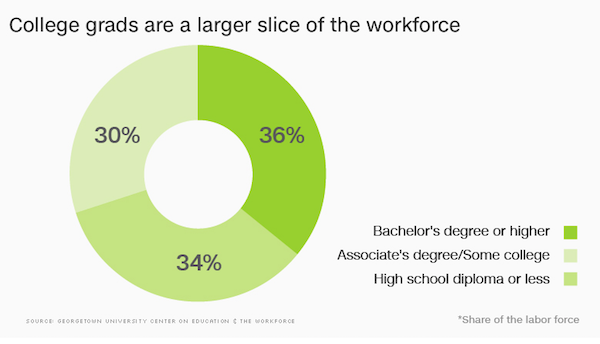New Report Says Bachelor’s Degree Holders Getting Most Jobs in the Recovery

A new national report maintains that college graduates are getting nearly all the jobs in the economic recovery.
Key findings in Georgetown University’s Center on Education and the Workforce’s report, “America’s Divided Recovery: College Haves and Have-Nots,” include that Bachelor’s degree holders gained 4.6 million jobs. Graduate degree holders gained 3.8 million jobs. Associate degree holders gained 3.1 million jobs while those with a high school diploma or less added only 80,000 jobs. The authors indicate Bachelor’s degree holders now earn 57 percent of all wages.
In short, the Report claims that 95% of all jobs created in the recovery have gone to those with a Bachelor’s degree or higher. More impressively, Bachelor’s degree holders now earn 57% of all wages.
Lead report author Anthony P. Carnevale, director of the Georgetown Center, writes that occupational and industry shifts have been the major drivers of change in the labor market, with the recovery adding mostly managerial and professional jobs.
TAMIU director of Career Services, Cassandra Wheeler, said she could confirm Texas job growth areas.
“In reviewing data from the Texas Higher Coordinating Board’s Data on Gainful Employment, we’re seeing job growth in key areas with information services, finance, sciences, and health services in the lead. Management Information Systems is at 100%, up from 80% last year. Finance is at 93%, up from 71% from last years’ gainful employment rate. Areas in Chemistry stayed at 100% for this and last year. Nursing has stayed at 98% for both years. These longtime TAMIU undergraduate degree areas are forecast to continue to have strong employment opportunities, ” Wheeler explained.
Gina González, TAMIU associate vice president of Student Success, said student interest in TAMIU undergraduate and graduate programs is indeed growing.
“We’ve seen a steady increase in student inquiries about TAMIU Bachelors and Masters programs. Interest is especially high in the degree areas of nursing, criminal justice and engineering. Increasingly, both students and their parents realize that a Bachelor’s degree is the preferred educational level for higher income careers and enhanced lifetime earnings,” she explained.

The Georgetown University authors used data from the Current Population Survey (CPS), administered monthly by the U.S. Census Bureau. Other data sources for specific sections are shared in the full report, available for free download at https://cew.georgetown.edu/cew-reports/americas-divided-recovery/#full-report
The Georgetown University Center on Education and the Workforce is an independent, nonprofit research and policy institute studying the link between individual goals, education and training curricula, and career pathways. It is affiliated with the Georgetown McCourt School of Public Policy.
Its web site indicates that “The Center on Education and the Workforce strives to better articulate links between education, career preparation, and workplace demands. We conduct research in three core areas with the goal of better aligning education and training with workforce and labor market demand: jobs, skills, and people.”
For more information, visit: cew.georgetown.edu.
A PowerPoint infographic presentation on the Report’s findings is located here:
http://www.slideshare.net/CEWGeorgetown/americas-divided-recovery-college-haves-and-havenots/1
A video on the report’s findings is here: https://cew.georgetown.edu/cew-reports/americas-divided-recovery/#powerpoint
The first day of classes for the Fall Semester 2016 at TAMIU is Tuesday, Aug. 23, 2016.
Please visit www.tamiu.edu/registrar/registration for assigned registration dates, email registrar@tamiu.edu, call the Office of the Registrar at 956.326.2250 or visit offices in the Senator Judith Zaffirini Student Success Center, Suite 121.
Additional TAMIU information is available at tamiu.edu and on social media sites on Facebook, Instagram, Twitter and YouTube.